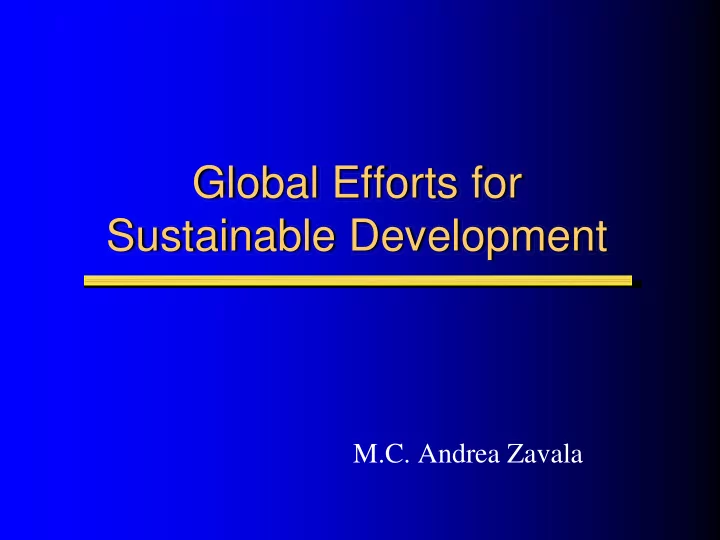

Global Efforts for Sustainable Development M.C. Andrea Zavala
“Sustainable Development – is development that meets the needs of the present without compro- mising the ability of future generations to meet their own needs.”
Historical Background � UN Conference on Environment and Development, or the 1992 Earth summit in Rio de Janeiro – unanimously adopted Agenda 21, a blueprint for sustainable development. � Millennium Development Goals – UN General Assembly resolution 55/2, outlined 8 targets aimed at reducing poverty and promoting sustainable development. � World Summit on Sustainable Development – reaffirmed the commitment to Agenda 21 and Millennium Development Goals
Pillars of Sustainable Development � Economic Development – poverty eradication � Social Development – active participation of women; education; good governance � Environmental Protection – prevent environmental degradation and patterns of unsustainable development At the local, national, regional, and global levels
Economic Development � Poverty eradication � Halve, by 2015, the proportion of the world’s people with income less than $1/day � Basic health services for all, reduce health threats � Increase food availability � Combat desertification, mitigate effects of drought and floods � Provision of clean drinking water � Enhance industrial productivity
Changing Unsustainable Patterns of Consumption and Production � Cleaner production technologies � Developing cleaner, more efficient energy technologies � Maintain urban air quality and health, and reduce greenhouse gas emissions � Sound management of chemicals throughout their life cycle, and of hazardous wastes
Protecting the Natural Resource Base of Economic & Social Development � Prevent water pollution to reduce health hazards and protect ecosystems � Watershed and groundwater management � Support desalination of seawater, water recycling � Ensure the sustainable development of oceans, marine environmental protection
Action Agenda – Focus on Five Key Thematic Areas Priority areas for action, identified by UN Secretary-General Kofi Annan: � W ater and sanitation � E nergy � H ealth � A griculture � B iodiversity protection and ecosystem management
Water and Sanitation “Water is not only the most basic of needs but is also at the center of sustainable development.” � Around 1.2 billion people still have no access to clean drinking water � Around 2.4 billion people do not have adequate sanitation.
Water and Sanitation Some key issues: � Prevent water pollution to reduce health hazards � Protect ecosystems � Introduce technologies for affordable sanitation, industrial and domestic wastewater treatment � River basin, watershed and groundwater management � Support desalination of seawater, water recycling � Marine environmental protection - oceans, seas, islands and coastal areas are essential components of the Earth’s ecosystem
Energy Some key issues: � Focus on access to energy in rural areas � Energy conservation and energy efficiency – building design & management, better mass transportation, advanced and innovative cleaner technologies � Promotion of renewable energy � Action on climate change – ratification by countries of the Kyoto Protocol
Health “Good health is vital for eradicating poverty and achieving sustainable development.” Some key issues: � Reduce mortality rates in 2015: by 66.7% for children & infants under 5; by 75% for maternal mortality rates � Control & eradicate communicable diseases, reduce HIV prevalence, combat malaria, tuberculosis � Ensure that chemicals are not used and produced in ways that harm human health � Reduce air pollution � Improve developing countries’ access to environmentally sound alternatives to ozone depleting chemicals
Agriculture “Agriculture is central to sustainable development. About 70% of the poor in developing countries live in rural areas and depend in one way or another on agriculture for their survival.” Some key issues: � Address serious soil fertility problems � Diversification of crops � Increase water-use productivity � Apply R&D to increase productivity in crops and livestock
Biodiversity & Ecosystem Management “Biodiversity and the ecosystems they support are the living basis of sustainable development.”
Biodiversity & Ecosystem Management Some key issues: � Significantly reduce the rate of biodiversity loss by 2010 � Reverse the trend in natural resource degradation � Restore fisheries to their maximum sustainable yields � Protection of the marine environment from land based sources of pollution
Recommend
More recommend